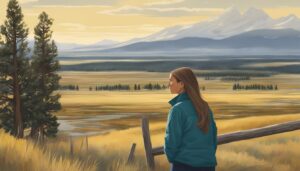Walker, portrayed by Ryan Bingham, is a multi-faceted character on the hit Paramount Network series Yellowstone. This former convict turned ranch hand brings a unique blend of grit and musical talent to the Dutton Ranch, adding depth to the show’s ensemble cast. As a cowboy with a troubled past, Walker’s journey on Yellowstone has been marked by conflicts and personal growth.
Bingham’s real-life musical prowess lends authenticity to Walker’s character, allowing him to showcase his singing and guitar-playing skills throughout the series. This artistic element sets Walker apart from other ranch hands and provides moments of respite amidst the often intense drama of Yellowstone.
Since his introduction in the first season, Walker has become a fan favorite, with his complex relationships and moral dilemmas keeping viewers engaged. His interactions with other characters, particularly his tumultuous dynamic with ranch foreman Rip Wheeler, have been central to his storyline and contributed significantly to the show’s compelling narrative.
Character Background and Profile
Walker, portrayed by Ryan Bingham, is a complex and intriguing character in the Paramount Network series Yellowstone. His background as a former convict and talented musician adds depth to his role as a ranch hand at the Dutton Ranch.
Origins and Development
Walker first appears in Yellowstone at the end of season 1. He’s introduced as a former inmate recruited by Rip Wheeler to work as a ranch hand at the Yellowstone Dutton Ranch. Walker’s past experiences and skills as a cowboy make him a valuable addition to the bunkhouse crew.
His character brings a unique perspective to the show, blending his cowboy lifestyle with musical talents. Ryan Bingham, who plays Walker, is a real-life singer-songwriter. This allows Walker’s character to showcase authentic musical performances throughout the series.
Role in the Dutton Family
As a ranch hand, Walker navigates the complex dynamics of the Dutton Ranch. He often finds himself at odds with the strict hierarchy and unwritten rules of the ranch. This tension creates conflict and adds intrigue to his storyline.
Walker’s journey involves struggles with loyalty and redemption. His relationship with the Dutton family and other ranch hands evolves throughout the series. He faces challenges in finding his place within the ranch’s structure while maintaining his individuality.
Walker’s skills as a cowboy prove valuable during cattle operations. In season 5, he participates in moving cattle from the Four Sixes Ranch back to Montana, demonstrating his competence in ranch work.
Ryan Bingham’s Portrayal of Walker
Ryan Bingham brings authenticity and musical talent to his role as Walker on Yellowstone. His acting and singing skills combine to create a complex, compelling character.
Acting Career
Bingham made his acting debut as Walker in Yellowstone’s first season. Despite being new to acting, he quickly became a fan favorite. Bingham’s portrayal of the ex-convict turned ranch hand is nuanced and natural. He infuses Walker with a quiet intensity and world-weary attitude.
Bingham’s real-life experience as a rodeo rider and ranch hand lends credibility to his performance. He moves and carries himself like a genuine cowboy. This authenticity helps Walker feel like a fully realized character rather than a caricature.
Incorporation of Music into Character
As an accomplished singer-songwriter, Bingham seamlessly integrates his musical talents into Walker’s character. Walker is often shown strumming his guitar and singing around the bunkhouse. This adds depth to the character and provides soulful moments on the show.
Bingham’s gravelly voice and folk-country style match perfectly with Walker’s brooding persona. His original songs enhance key emotional scenes. The music gives insight into Walker’s inner thoughts and struggles. It’s a unique element that sets the character apart and showcases Bingham’s versatility as a performer.
Walker’s Relationships with Other Characters

Walker’s interactions with key figures at Yellowstone Dutton Ranch shape his complex journey. His alliances and conflicts reveal the intricate dynamics within the bunkhouse and broader ranch community.
Alliance with Key Figures
Walker forms an unexpected bond with Beth Dutton. Their shared outsider status and rebellious spirits create a unique understanding between them. Beth appreciates Walker’s musical talent and straightforward nature.
Jimmy, another ranch hand, develops a friendly rapport with Walker. The two often share moments of camaraderie in the bunkhouse. Walker’s experience and laid-back attitude make him a supportive figure for Jimmy as he navigates ranch life.
Walker’s relationship with John Dutton is characterized by mutual respect tinged with wariness. John recognizes Walker’s skills but remains cautious due to his criminal past.
Contentions and Conflicts
Rip Wheeler and Walker have a fraught relationship marked by tension and distrust. Rip views Walker as unreliable and a potential threat to ranch loyalty. Their clashes often escalate, creating a palpable divide in the bunkhouse.
Lloyd, a senior ranch hand, initially welcomes Walker but grows increasingly wary of his influence. Their relationship sours when Walker becomes involved with Laramie, Lloyd’s love interest.
Walker’s encounter with Wade Morrow highlights his complex position within the ranch. While forced to participate in violent acts against Morrow, Walker’s reluctance underscores his moral struggles.
Storyline Evolution and Key Episodes

Walker’s journey on Yellowstone takes him from ex-convict to ranch hand, facing challenges and conflicts along the way. His character arc spans multiple seasons, featuring pivotal moments that shape his role on the Dutton Ranch.
Introduction to Yellowstone
Walker first appears in Yellowstone’s season 1 finale. Rip Wheeler recruits him straight out of prison, seeing potential in the former convict as a ranch hand. Walker’s musical talents and troubled past immediately set him apart from other characters. His initial episodes focus on adapting to life at the Yellowstone Dutton Ranch and clashing with the strict hierarchy.
Notable Plot Developments
Season 3 marks a turning point for Walker. In the episode “I Killed a Man Today,” he becomes entangled in a dangerous situation involving the Dutton family’s enemies. This event tests his loyalty and pushes him to make difficult choices.
Walker’s relationship with fellow ranch hand Laramie adds complexity to his character. Their romance creates tension with other cowboys, particularly Lloyd.
Seasonal Arcs and Character Growth
Season 4 sees Walker grappling with his place on the ranch. He faces the consequences of his actions and must prove his worth to the Duttons. His musical performances become more frequent, offering glimpses into his inner turmoil.
In Season 5, Walker’s role evolves further. He takes on more responsibilities at the ranch while continuing to navigate complex relationships. His past experiences inform his decisions, showing growth and maturity.
Walker’s appearances throughout the series highlight his struggle between seeking redemption and maintaining his individuality. His character serves as a reflection of the changing dynamics within the Yellowstone Ranch.
Walker’s Iconic Quotes

Walker, portrayed by Ryan Bingham on the hit series Yellowstone, is known for his sharp wit and memorable lines. His quotes often reflect his complex character and tumultuous journey on the Dutton Ranch.
One of Walker’s most impactful quotes comes from his early days at Yellowstone:
“Listen mister, I don’t know you, but I know if you’re wearing that brand then you must be a bad person. And if they want it back then you must be even worse.”
This line showcases Walker’s keen observation skills and his willingness to speak his mind, even in potentially dangerous situations.
Walker’s musical talents also shine through in his dialogue. He often expresses himself through song lyrics, adding depth to his character and providing insight into his emotions.
His interactions with other characters, particularly Rip Wheeler, have produced some of the show’s most tense and quotable moments. Walker’s ability to stand his ground and deliver powerful retorts has made him a fan favorite.
Throughout the series, Walker’s quotes demonstrate his struggle between his desire for freedom and the obligations of ranch life. His words often reflect the internal conflict he faces as he navigates the dangerous world of the Yellowstone Dutton Ranch.
Cultural Impact and Fan Reception

Walker’s character has significantly influenced the Western genre and garnered a dedicated fan following. His portrayal blends traditional cowboy elements with modern complexities, resonating with viewers.
Influence on Western Genre
Walker’s character in Yellowstone has helped revitalize the Western genre for modern audiences. His background as an ex-convict and aspiring musician adds depth to the traditional cowboy archetype. This complexity appeals to viewers seeking more nuanced portrayals in Western dramas.
Ryan Bingham’s real-life musical talents, incorporated into Walker’s character, bring authenticity to the show’s depiction of ranch life. This integration of music has inspired other Western productions to explore similar creative avenues.
Walker’s storylines often challenge conventional Western tropes, pushing the boundaries of the genre. His conflicts with other characters and moral dilemmas present a more realistic view of contemporary ranch life.
Fan Base and Popularity
Walker has become a fan favorite character on Yellowstone, with viewers drawn to his rebellious nature and musical talents. Social media platforms buzz with discussions about his storylines and character development after each episode airs.
Ryan Bingham’s existing music fans have crossed over to become Yellowstone viewers, expanding the show’s audience. This crossover appeal has boosted both Bingham’s music career and the show’s popularity.
Walker’s unpredictable nature keeps fans guessing about his next moves, generating excitement and theories among the Yellowstone community. Fan art and cosplay featuring Walker have become common at Western-themed events and conventions.
The character’s popularity has led to increased screen time and more prominent storylines in recent seasons of Yellowstone. This fan-driven evolution demonstrates the impact of audience reception on character development in modern television.
Comparisons and Contrasts with Historical Cowboys

Walker’s character in Yellowstone provides an intriguing blend of modern and historical cowboy elements. His portrayal offers insights into the evolution of the cowboy archetype from its 19th-century roots to contemporary representations.
Realism in the Portrayal
Walker’s background as an ex-convict turned ranch hand reflects a realistic aspect of historical cowboy life. Many real cowboys in the Old West had checkered pasts or sought new beginnings on the frontier. His musical talents, showcased through Ryan Bingham’s performances, align with the cowboy tradition of sharing stories through song.
Walker’s struggles adapting to ranch life mirror challenges faced by novice cowboys in the past. His conflicts with seasoned hands like Rip Wheeler echo historical tensions between established ranchers and newcomers in places like Montana and West Texas.
Mythology vs. Historical Accuracy
Yellowstone’s portrayal of Walker balances cowboy mythology with historical realities. His character embodies the romanticized notion of the singing cowboy, popularized by early Western films and radio shows.
However, Walker’s complex morality and inner conflicts provide a more nuanced view than traditional cowboy heroes. This portrayal aligns with historical accounts of cowboys as diverse individuals with varying backgrounds and motivations.
The show’s Montana setting, while geographically accurate, presents a more dramatized version of modern ranch life compared to historical realities. Walker’s experiences on the Yellowstone Ranch blend elements of traditional cowboy work with contemporary challenges, reflecting the evolution of ranching in the American West.



